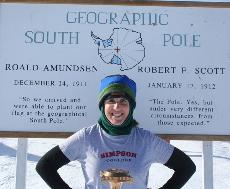Simpson grad gains a world of experience as an arctic dishwasher

February 20, 2008
While many seniors may wonder where their lives will take them after graduation, Jill Fox, a 1996 graduate of Simpson, has found her own adventure in Antarctica. Fox majored in French and was president of Alpha Chi Omega.
While looking through her choices of where to travel, Fox who had already been to 46 of the states and 18 countries, decided to go to Antarctica.
“I like to experience extreme climates,” Fox said. “I had already been in the Sahara Desert heat as a Peace Corps volunteer in Mali and in extreme cold in Barrow, Alaska, at 80 below zero. This was another challenge for me–and what’s more extreme then the South Pole?”
Fox got a job four-month stint washing dishes, which ended Feb. 14. Most of the higher end positions are for scientific work and technical jobs. She worked 10-hour shifts with two 30-minute breaks for meals. Fox lived at the South Pole Station, which is a small town and college campus condensed into one building. Fox worked in the kitchen and had a dorm room in the main station. Most of her time was spent indoors, where it’s warmer.
“The South Pole is the coldest place on earth with an average temperature of 16 degrees below zero,” Ryan Rehmeier, assistant professor of biology and environmental science, said. “There are only several hundred people in Antarctica during the summer months, but it’s such a great place to study the skies and atmosphere and it’s the best place in the world to study climate change. Antarctica is an important place in the world because 90 percent of the earth’s ice is there as well as 70 percent of freshwater that is needed for the rest of the earth.”
As far as activities are concerned, Fox says there are many organized events like yoga, Pilates, volleyball, basketball and indoor soccer games. There are also “Pub Trivia” night and movie nights.
Fox found her job in Antarctica by going online and then to the Raytheon Polar Services Job Fair in April. A couple weeks later, Fox was hired and she was off for Antarctica by mid-October.
There are a couple of work seasons to choose from–October to February, October to October or February to October.
Fox encourages those who interested in traveling to Antarctica to alleviate the costs of the trip by working during your stay. About 75 percent of the workers in Antarctica went through the Raytheon Polar Services. Some people can find science projects on the National Science Foundation Web site. Applicants need basic experience and some previous education for all of the jobs.
Jobs that are available include cargo people, utility technicians, cooks, dentists, hairdressers, doctors, physical therapists and firefighters. Anyone interested in learning more about this trip and others can go to www.rayjobs.com and view the openings.
“Persistence pays off,” Fox said. “Many people applied for a few years before finally getting a foot in the door. Antarctica is an exciting place and I feel lucky to have had the opportunity to be here. I encourage anyone who is interested to look into this Web site because it’s never too late and few will regret it.”
To learn more about Fox’s adventure and time in Antarctica, go to her Web site at www.antartic-dishwasher.net. There you can find all of the information and details about Fox’s journey.
“Expanding your horizons doesn’t mean you have to do it later in life,” Del Shepard, director of career services said. “These experiences will stay with you for the rest of your lives. A lot of people don’t appreciate what they have gained until they are out of college. The experience Jill Fox is gaining will stay with her for the rest of her life.”




